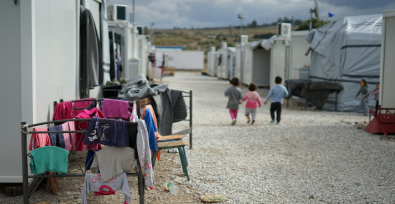This year’s Global Report on Trafficking in Persons found a 25 percent increase in trafficking victims between 2019 and 2022. Info Migrants reports that the rise is attributed to a spike in child exploitation and forced labor cases globally.
Overlapping and intersecting flashpoints
Reviewing over 1,000 court cases from 156 countries, the 2024 report pointed to several overlapping factors that contributed to a person’s vulnerability to being trafficked. One of those is the increase in migration globally. Poverty, conflict, and the ongoing climate crisis all contribute to migrants and asylum seekers falling prey to traffickers in greater numbers.
It starts in the country of origin. Many migrants go into debt to pay for their transit or smuggling fees. That means they are saddled with debt even before they leave home. Then if they arrive safely, they often do not have access to regular work in their destination country. That opens the door to forced labor and forced criminality.
A spokesperson for The International Organization for Migration said:
“We have anecdotal evidence on the global level of victims of trafficking being forced to engage in crimes such as forced drug trafficking and selling, making threats and enforcing violence, murder, terrorism, and armed conflict,”
A previous report underlined that migrant workers are three times more likely to end up as victims of forced labor or exploitation compared to local workers. And the 2024 report found that, right now there were more cases of forced labor than sex trafficking globally. Sadly, many of those forced labor victims also ended up in forced criminality. In cases of forced criminality, the UNHCR stresses it is imperative to identify those involved as victims rather than perpetrators and treat them as such.
Increase in conviction rate a silver lining
While there has been an overall increase in human trafficking globally, there has also been an uptick in the conviction rate. Some regions mentioned in the report had up to a 29 percent increase in convictions of human trafficking. But experts are cautiously optimistic at this stage.
Suzanne Hoff, International Coordinator for La Strada International said:
“Trafficking is a notoriously difficult crime to prove. We have seen many cases dismissed because of a lack of evidence. For example, in cases of trafficking for forced labor, it is very difficult to hold companies and employers liable,”
However, recent legislative changes, like the revised European Union anti-trafficking directive may help improve prosecution rates going forward. By introducing stricter sanctions and investigative tools Freedom United hopes the directive may help address the uptick in human trafficking.







Freedom United is interested in hearing from our community and welcomes relevant, informed comments, advice, and insights that advance the conversation around our campaigns and advocacy. We value inclusivity and respect within our community. To be approved, your comments should be civil.